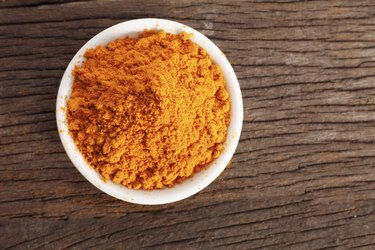
Many spices common in cooking have also been used medicinally by various cultures throughout history. Turmeric and cayenne pepper are included in recipes in many types of cultural cuisine and are purported to have healing effects for more than just minor ailments. Regularly preparing food with these two spices may provide a major line of defense against digestive problems and even diseases such as cancer, according to UCLA Brain Research Institute and Memorial Sloan-Kettering Cancer Center.
Turmeric
Video of the Day

Turmeric is a woodsy, sharp tasting spice derived from a root. It's related to ginger and routinely included in South Asian food preparation. Turmeric adds a yellow tint to dishes and goes well with many types of food, such as rice, cauliflower, lentils and potatoes. Although India is the main producer of turmeric, it's also grown in Indonesia and China. You can get plenty of turmeric from regularly eating Indian cuisine, but it can also be taken medicinally in tablet, tincture or powder form.
Video of the Day
Turmeric Health Benefits

Turmeric has traditionally been used in Asian countries as a homeopathic cure for common conditions such as arthritis and heartburn. However, researchers at the UCLA Brain Research Institute believe a constituent found in turmeric called curcumin can help fight even more serious conditions by partially shutting down powerful proteins that trigger inflammation. Turmeric may help lower cholesterol and may also provide strong antioxidant protection against diseases such as cancer. Animal studies conducted at the University of Texas M.D. Anderson Cancer Center concluded that turmeric helps block skin cancer growth and melanoma, and it may thwart the spread of other types of cancer, such as breast cancer, according to the UCLA Brain Research Institute.
Cayenne Pepper

Cayenne pepper originally came from the Americas and was one of many medicinal plants that Christopher Columbus presented to the Spanish Queen and King. He was the first to refer to it as pepper because of its similarity in taste to black pepper, which was regularly imported from Indonesia to Spain. Cayenne pepper is a fruit, and like many other common spices it may provide several practical health benefits. You can get cayenne pepper whole, as a powder and as flakes. While it's common to just add the spice to foods during cooking, you can also drink it in a medicinal infusion or take it in capsule form, according to herbalist Andrew Chevallier.
Cayenne Pepper Health Benefits

Cayenne pepper has been used historically as an analgesic, antiseptic and counter-irritant. It may also help relieve digestive problems, such as gas and intestinal spasms, and it provides a stimulant effect that is utilized for relieving nerve pain. Due to constituents such as capsaicin, cayenne pepper may provide powerful antioxidant protection against cancers such as lymphoma and leukemia, according to Memorial Sloan-Kettering Cancer Center. Capsaicin may also help with heart disease and diabetes, and it purportedly packs more antioxidant power than broccoli, spinach or carrots, according to the cancer center website.
Warning

You cannot rely on spices to help you fight serious illnesses, such as diabetes or cancer. Always check with your health care provider before consuming spices, especially for medicinal purposes. If you are being treated for an illness or suspect you have one, follow your physician's advice for treatment. While many health experts in the 21st century agree that spices may play an important role in helping to prevent disease, studies are not conclusive.